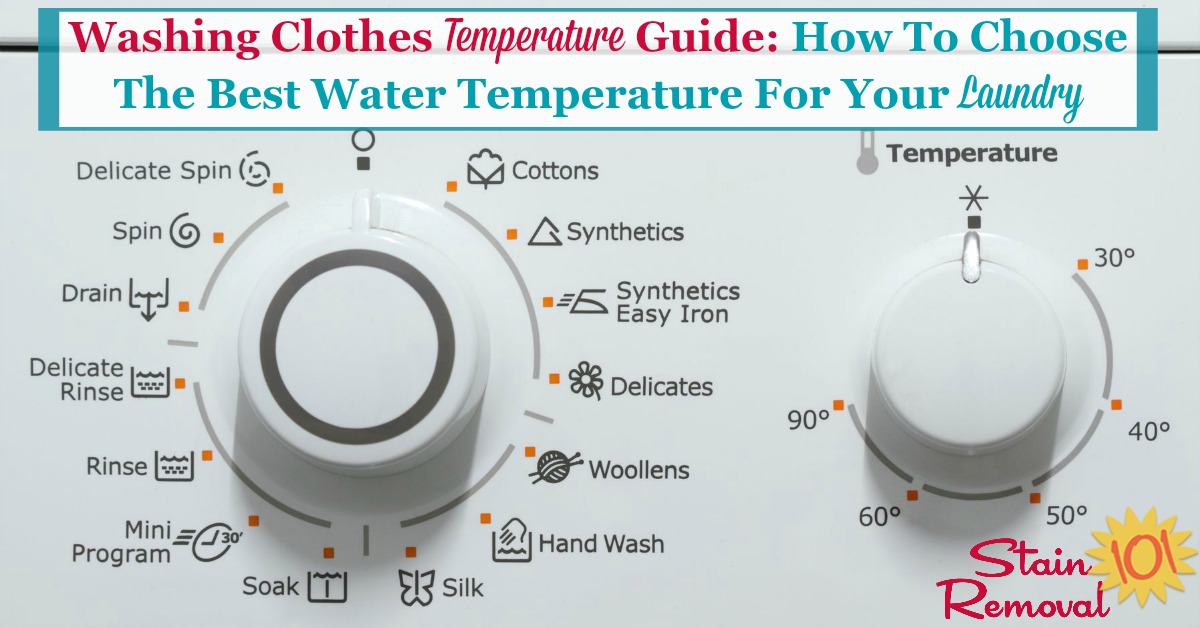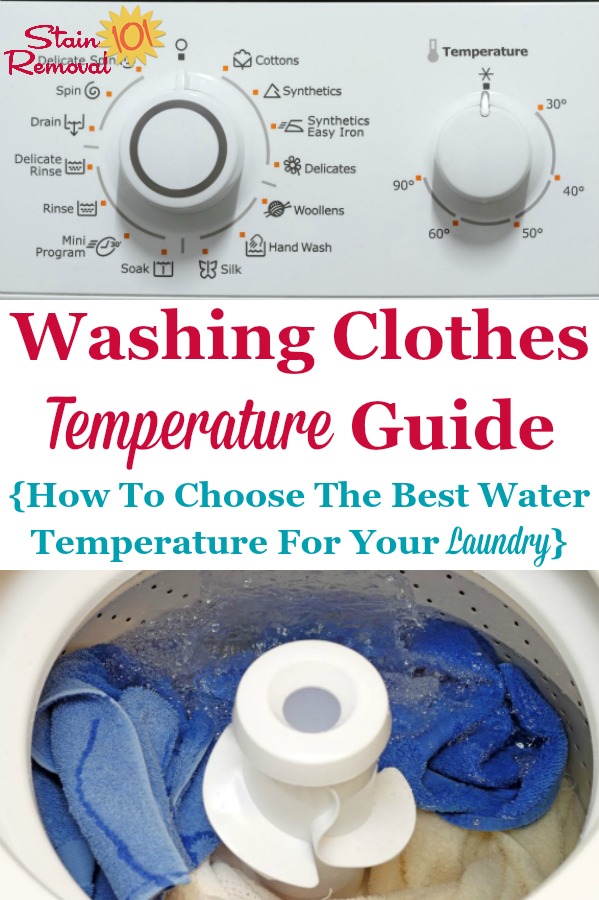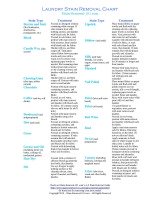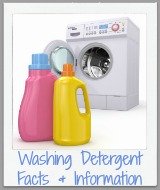Washing Clothes Temperature Guide: How To Choose The Best Water Temperature For Your Laundry
Here is the ultimate washing clothes temperature guide, so you know how to choose the best water temperature for your laundry to get it clean, keep it from being damaged, and conserve energy.

Every time you wash a load of laundry one of the things you've got to decide is what temperature water you'll choose to wash it in.
Perhaps this isn't something you've thought a lot about before, and instead just do the same thing over and over.
I know I didn't about water temperature for washing my clothes for many years, doing instead exactly what my parents always did.
But then I learned that the temperature of the water I choose to wash my clothes in makes a huge difference in important factors including energy efficiency, how well the clothes get clean, and even the amount of wear and tear on the fabric.
Therefore, here's a helpful guide for how to choose the best water temperature when washing different types of loads of laundry.
Balancing Factors When Deciding On Water Temperature
There is ultimately no absolute right or wrong answer when choosing to wash your clothes in cold, warm or hot water. Instead, the decision you make will be based on a balancing of a couple of factors which I already mentioned above, including:
- Energy efficiency;
- Cleaning power; and
- Wear and tear on clothing
Washing clothes in either warm or hot water will use more energy than washing in cold water, and therefore to save money, or to be friendlier to the environment many people like to choose cold water for clothes washing.
You can also save energy, no matter what water temperature you use, by only washing clothes as often as really needed, and not more frequently. (You can use this guide to how often to wash laundry here to help you know the right frequency you should be washing various types of clothing and household items in your home.)

Typically though, with a few exceptions, the warmer the water the better your laundry gets cleaned.
Detergents, stain removers, and even bleaches work better in hotter water.
Hotter water also is better at sanitizing clothes (assuming it is hot enough) than cold water, and also works better to remove odors and stains, especially greasy and oily spots.
Further, warmer water is better at dissolving powdered detergents and also the popular laundry pacs or pods that many people use these days.
Hot water for laundry does have its draw backs though. The warmer the water the more likely the clothes or other fabrics are to fade or shrink, not necessarily with just one wash, but more over time.
In addition, when presoaking certain stains, like protein stains like blood, you want to use cool water, and not hot, so you don't set the stain.
Balancing these pros and cons of hot versus cold water in your laundry is one of the things you'll need to think about when washing clothes or other household items.
What Do These Temperature Terms Really Mean?
I just told you some of the pros and cons for washing with hot, warm or cold water, but you should be asking yourself, "what do these terms really mean?"
Think about it. The "cold" water that comes out of your tap in the summer in Texas, which may feel a bit lukewarm, is different than the "cold" water that comes out in the winter in Illinois, which can be quite frigid. Same for the hot water, because people's hot water heaters are set to different temperatures for the high end, typically in the range of 120°-140° F.
Because of these variations in different areas what manufacturers mean by the terms "cold," "warm," and "hot," are actually short hand for certain standard temperature ranges, even if those don't actually match up with the temperature of the waters designated as these terms as it comes out of your washing machine.
Here are the standard ranges:
- Cold water: 65°-80° F
- Warm water: 90°-110° F
- Hot water: 130° F and up
What you can see from these standard ranges is that what care labels are calling "cold" water is really more lukewarm, or cool.
In fact, what I would consider cold water, which is 65° F or lower, is actually not good to wash clothes in. Even when using cold water detergents your clothes will not get as clean in these extremely low temperatures, and you should add some heat to the water to get it at least lukewarm so your laundry can actually get clean.
Helpful Guide For What Temperature To Wash Various Items
So what's the bottom line about what temperature you should wash your laundry in?
As I began the article I said there are no absolutes, but here are the guidelines I would suggest, assuming the care labels of the fabrics state it is safe to wash the clothing in these temperature ranges:
- Hot water - dish towels, dish cloths, sheets and pillowcases, bath and hand towels, cleaning rags, and also any clothing when someone has been sick, as well as heavily soiled or stained clothing, such as children's play clothes, gym clothes, or similar items
- Warm water - clothes to be washed in the permanent press cycle, as well as bright clothes and dark clothes that would noticeably fade after many washes in hotter water
- Cold water - for delicates, lightly soiled clothing, and any fabrics with dyes that bleed or run (also wash those items separately from everything else)
What temperature water do you normally use to wash your laundry? I'd love to hear what you have decided to do, and why, so tell me below in the comments.
Thanks For Visiting My Website: Grab Your Free Gift!

Hi, I'm Taylor, a busy mom with 3 kids, so I have lots of hands on experience with house cleaning, laundry and my fair share of spots, spills and other messy catastrophes. Thanks for visiting my site.
I update the website all the time with tips, tutorials, cleaning recipes, reviews of products from readers like you, and tests I've done on various cleaners, removers and laundry supplies.
I'd love to give you a gift! When you subscribe to my free weekly newsletter you will receive a free printable laundry stain removal chart that you can reference as needed.
I hope you enjoy this gift, and stop by again soon!
Related Pages You May Enjoy
Laundry Tips & Tricks For Everyone
7 Frugal Laundry Tips {Save Money While Keeping Your Clothes Clean}
Go From Washing Clothes Temperature Guide To Home Page
CAUTION: This website is provided for informational purposes only. It is provided as is, without warranties or guarantees. Some stains and messes just won't come out, and are permanent. Further, some cleaning methods can harm your item, so if what you want to clean or launder is sentimental or expensive call a professional. See disclaimer of liability for more information.
Popular Laundry How To's
How Often To Wash Everything {With Printable}
Fix Bleeding Dyes Or Dye Transfer
Let's Stay Connected!
Get Free Email Updates
(and get a FREE printable)
Related Pages
 Detergent Reviews & Information
Detergent Reviews & Information
 Visit Household Management 101
Visit Household Management 101
 Visit Home Storage Solutions 101
Visit Home Storage Solutions 101






Share Your Comments, Tips & Ideas